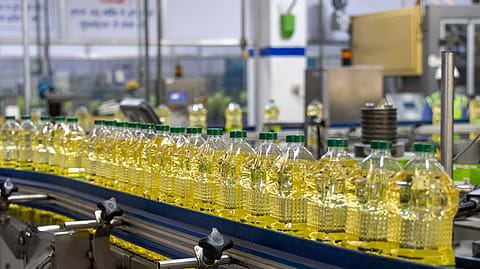Edible oil imports from Nepal surge 44% as duty evasion concerns mount
India permits duty-free edible oil imports from Nepal under the South Asian Free Trade Area (SAFTA) framework.

Edible oil imports from Nepal have risen sharply in early 2025, reaching over 1.80 lakh metric tonnes between January and March—up from 1.25 lakh tonnes of whole of 2024, Indian Vegetable Oil Producers Association (IVPA), the apex body representing India’s edible oil refining industry, has pointed out. India permits duty-free edible oil imports from Nepal under the South Asian Free Trade Area (SAFTA) framework.
The surge in imports is distorting the domestic edible oil market by creating an uneven playing field for Indian processors and refiners, impacting farm gate oilseed prices, and leading to underutilisation of domestic capacity, the association points out.
According to IVPA, most of the 1.24 lakh tonnes import in 2024 also happened during the October-December period after India hiked import duty on edible oil for other countries. The association allege that the surge in import is a case of re-routed imports of soya to India via Nepal to evade duties. This growth, they say is not backed by Nepal’s own oilseed production capacity and hence raises serious questions around the effective enforcement of Rules of Origin and the risk of third-country routing. “Due to the prevailing fear of further zero-duty inflows, market sentiment around oilseed prices has also weakened, resulting in farmers receiving significantly below the MSP—despite the sharp increase in import duties and other corrective measures”, Sudhakar Desai, President, IVPA says.
In a letter to Union Agriculture Minister Shivraj Singh Chouhan, IVPA wanted all clearances of edible oils imported under SAFTA provisions be allowed only against a Security Deposit or Bank Guarantee until the Rules of Origin (RoO) criteria is verified by the authorities. They also called for enhanced border checks by Indian Customs authorities to ensure strict adherence to RoO provision. The association also urged the government to shift the designated Port of Entry for crude edible oil shipments to Nepal be shifted from Haldia to alternate ports such as Visakhapatnam and allow exports of finished edible oil products from Nepal to India be allowed only through the same port used for importing the raw material (crude edible oil). “This will allow Customs and other authorities to match and verify import-export data effectively”, Desai said. A quota system (like the one implemented for Vanaspati imports from Nepal) to regulate the volume of refined oil benefiting from duty-free access has also been proposed.